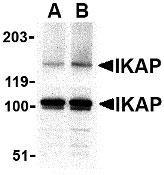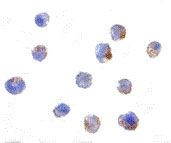IKAP Antibody
- SPECIFICATION
- CITATIONS
- PROTOCOLS
- BACKGROUND

Application
| WB, IF, ICC, E |
|---|---|
| Primary Accession | O95163 |
| Other Accession | AAC64258, 3757822 |
| Reactivity | Human, Mouse |
| Host | Rabbit |
| Clonality | Polyclonal |
| Isotype | IgG |
| Calculated MW | Predicted: 134, 147 kDa Observed: 105, 145 kDa |
| Application Notes | IKAP antibody can be used for detection of IKAP by Western blot at 0.5 to 1 µg/mL. Antibody can also be used for immunocytochemistry starting at 1 µg/mL. For immunofluorescence start at 20 µg/mL. |
| Gene ID | 8518 |
|---|---|
| Other Names | IKAP Antibody: FD, DYS, ELP1, IKAP, IKI3, TOT1, Elongator complex protein 1, IkappaB kinase complex-associated protein, inhibitor of kappa light polypeptide gene enhancer in B-cells, kinase complex-associated protein |
| Target/Specificity | IKBKAP; At least two isoforms of IKAP are known two exist, this antibody will detect both isoforms. |
| Reconstitution & Storage | IKAP antibody can be stored at 4℃ for three months and -20℃, stable for up to one year. As with all antibodies care should be taken to avoid repeated freeze thaw cycles. Antibodies should not be exposed to prolonged high temperatures. |
| Precautions | IKAP Antibody is for research use only and not for use in diagnostic or therapeutic procedures. |
| Name | ELP1 (HGNC:5959) |
|---|---|
| Function | Component of the elongator complex which is required for multiple tRNA modifications, including mcm5U (5-methoxycarbonylmethyl uridine), mcm5s2U (5-methoxycarbonylmethyl-2-thiouridine), and ncm5U (5-carbamoylmethyl uridine) (PubMed:29332244). The elongator complex catalyzes the formation of carboxymethyluridine in the wobble base at position 34 in tRNAs (PubMed:29332244). Regulates the migration and branching of projection neurons in the developing cerebral cortex, through a process depending on alpha-tubulin acetylation (By similarity). ELP1 binds to tRNA, mediating interaction of the elongator complex with tRNA (By similarity). May act as a scaffold protein that assembles active IKK-MAP3K14 complexes (IKKA, IKKB and MAP3K14/NIK) (PubMed:9751059). |
| Cellular Location | Cytoplasm. Nucleus |

Thousands of laboratories across the world have published research that depended on the performance of antibodies from Abcepta to advance their research. Check out links to articles that cite our products in major peer-reviewed journals, organized by research category.
info@abcepta.com, and receive a free "I Love Antibodies" mug.
Provided below are standard protocols that you may find useful for product applications.
Background
IKAP Antibody: IKAP was initially identified as a scaffold protein of the IκB kinase complex that could bind to IKKα, IKKβ, NF-κB, and the NF-κB-inducing kinase (NIK), although later evidence has cast doubt on this. More recent reports show that mutations in IKAP such as a frameshift leading to a truncated protein or a missense mutation that leads to defective phosphorylation are responsible for the autosomal recessive genetic disease familial dysautonomia (FD). Reports indicating that it forms part of the RNA polymerase II transcription elongation complex suggest that this disease may be due to compromised transcription elongation. More recently, it was shown that IKAP associates with c-Jun N-terminal kinase (JNK) and could specifically enhance JNK activation induced by the upstream JNK activators MEKK1 and ASK1, indicating another possible cause for FD.
References
Cohen L, Henzel WJ, and Baeuerle PA. IKAP is a scaffold protein of the IkB kinase complex. Nature 1998; 395:292-6.
Krappmann D, Hatada EN, Tegethoff S, et al. The I kappa B kinase (IKK) complex is tripartite and contains IKK gamma but not IKAP as a regular component. J. Biol. Chem. 2000; 275:29779-87.
Anderson SL, Coli R, Daly IW, et al. Familial dysautonomia is caused by mutations of the IKAP gene. Am. J. Hum. Genet. 2001; 68:753-8.
Hawkes NA, Otero G, Winkler GS, et al. Purification and characterization of the human elongator complex. J. Biol. Chem. 2002; 277:3047-52.
If you have used an Abcepta product and would like to share how it has performed, please click on the "Submit Review" button and provide the requested information. Our staff will examine and post your review and contact you if needed.
If you have any additional inquiries please email technical services at tech@abcepta.com.













 Foundational characteristics of cancer include proliferation, angiogenesis, migration, evasion of apoptosis, and cellular immortality. Find key markers for these cellular processes and antibodies to detect them.
Foundational characteristics of cancer include proliferation, angiogenesis, migration, evasion of apoptosis, and cellular immortality. Find key markers for these cellular processes and antibodies to detect them. The SUMOplot™ Analysis Program predicts and scores sumoylation sites in your protein. SUMOylation is a post-translational modification involved in various cellular processes, such as nuclear-cytosolic transport, transcriptional regulation, apoptosis, protein stability, response to stress, and progression through the cell cycle.
The SUMOplot™ Analysis Program predicts and scores sumoylation sites in your protein. SUMOylation is a post-translational modification involved in various cellular processes, such as nuclear-cytosolic transport, transcriptional regulation, apoptosis, protein stability, response to stress, and progression through the cell cycle. The Autophagy Receptor Motif Plotter predicts and scores autophagy receptor binding sites in your protein. Identifying proteins connected to this pathway is critical to understanding the role of autophagy in physiological as well as pathological processes such as development, differentiation, neurodegenerative diseases, stress, infection, and cancer.
The Autophagy Receptor Motif Plotter predicts and scores autophagy receptor binding sites in your protein. Identifying proteins connected to this pathway is critical to understanding the role of autophagy in physiological as well as pathological processes such as development, differentiation, neurodegenerative diseases, stress, infection, and cancer.




